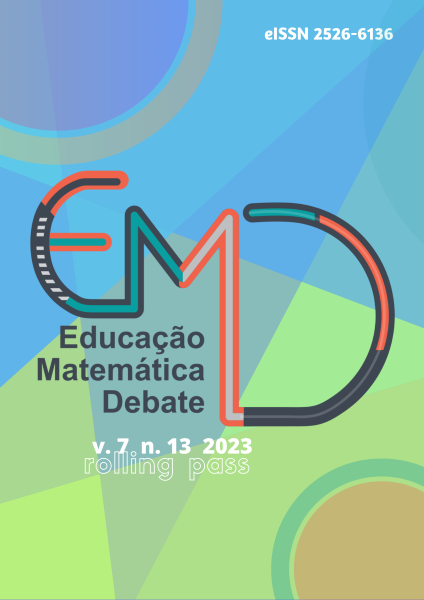The game Slice Fractions as a space to teach fractions and openness to the constitution of mathematical knowledge
DOI:
10.46551/emd.v7n13a12Keywords:
Game, Slice Fractions, Mathematics Education, KnowledgeAbstract
This work intends to discuss the game Slice Fractions, identify the open potentialities to teach fractions and the meanings made possible to the students who play. For the methodology, the Digital Game Based Learning (DGBL) and the husserlian phenomenology are articulated. In the experience with the game brought to the discussion, the participants presented the meanings of fractions as part-whole; number; operations; comparisons; ordination. Playing the game is situated as an element of our presence, so the meaning of mathematical objects, fractions, is revealed as the constitution of knowledge in the act of playing Slice Fractions articulated with the resolution of problems in the game. Intertwined with the elements of the game, it emerges in the process of playing with the person's activity that constitutes mathematical knowledge and opens up to dialogue with the other.
Downloads
References
AARSETH, Espen. O jogo da investigação: abordagens metodológicas à análise de jogos. Caleidoscópio, Lisboa, n. 4, p. 9-23, 2003.
AKAMINE, Caio Shindi; PROENÇA, Marcelo Carlos de. Ensino-aprendizagem de adição de frações via resolução de problemas. Tecné, Episteme y Didaxis, n. 52, p. 303-322, 2022.
BEHR, Merlyn J.; LESH, Richard; POST, Thomas R.; SILVER, Edward A. Rational number concepts. In: LESH, Richard.; LANDAU, M. (Ed.), Acquisition of Mathematics concepts and processes. New York: Academic Press, 1983, p. 91-125.
BICUDO, Maria Aparecida Viggiani. A lógica da pesquisa qualitativa e os modos de procedimentos nela fundados. Revista Pesquisa Qualitativa, v. 9, n. 22, p. 540-552, 2021.
BICUDO, Maria Aparecida Viggiani. The constitution of mathematical science from a phenomenological perspective. Revista Internacional de Pesquisa em Educação Matemática, Brasília, v. 1, n. 1, p. 54-67, 2011.
BICUDO, Maria Aparecida Viggiani. Filosofia da Educação Matemática segundo uma perspectiva fenomenológica. In: BICUDO, Maria Aparecida Viggiani. (Org.). Filosofia da Educação Matemática: Fenomenologia, concepções, possibilidades didático-pedagógicas. São Paulo: Editora da Unesp, 2010, p. 23-46.
BRASIL, Ministério da Educação. Secretaria de Educação Básica. Base Nacional Comum Curricular: Educação Infantil e Ensino Fundamental. Brasília: MEC/SEB, 2017.
BRASIL. Ministério da Educação. Secretaria de Educação Fundamental. Parâmetros Curriculares Nacionais: Matemática (1ª a 4ª séries). Brasília: MEC/SEF, 1997.
ALES BELLO, Angela. Introdução à Fenomenologia. Tradução de Miguel Mahfoud e Marina Massimi. Bauru: EDUSC, 2006.
BROWN, Stuart L. Play: how it shapes the brain, opens the imagination, and invigorates the soul. Londes: Penguin, 2009.
D’AMBRÓSIO, Ubiratan. Por que se ensina Matemática?. Brasília: SBEM, 2013.
GADAMER, Hans-Georg. Verdade e método: traços fundamentais de uma hermenêutica filosófica. Tradução de Flávio Paulo Meurer. 3.ed. Petrópolis: Vozes, 1999.
GEE, James Paul. Games for learning. Educational Horizons, v. 91, n. 4, p. 16-20, apr. 2013.
GEE, James Paul. Learning and Games. In: SALEN, Katie. (Ed). The Ecology of Games: connecting youth, games and learning. Cambridge: The MITPress, 2008, p. 21-40.
JUUL, Jesper. The art of failure: an essay on the pain of playing video games. Cambridge: The MIT Press, 2013.
JUUL, Jesper. Half-Real: video games between real rules and fictional worlds. Cambridge: The MIT Press, 2005.
JUUL, Jesper. A clash between game and narrative: a thesis on computer games and interactive fiction. Copenhagen: University of Copenhagen, 1989.
KIEREN, Thomas E. Personal knowledge of rational numbers: its intuitive and formal development. In: HIEBERT, James; BEHR, Merlyn. (Ed.) Number concepts and operations in the middle grades. Reston: NCTM, 1988, p. 162-181
NOVAES, Barbara Winiarski Diesel; PINTO, Neuza Bertoni. Estudos recentes sobre frações no campo da História da Educação Matemática: avanços e desafios. REnCiMa, São Paulo, v. 12, n. 5, p. 1-20, 2021.
NUNES, Terezinha; BRYANT Peter; PRETZLIK, Ursula; BELL, Daniel; EVANS, Deborah; WADE, Joanna. Children’s understanding of fractions: a compreensão das crianças sobre frações. Contrapontos, São Paulo, v. 8, n. 3, p. 509-517, set./dez. 2008.
PAPERT, Seymour. Mindstorms: children, computers and powerful ideas. New York: Basic Books, 1980.
PAULO, Rosa Monteiro; FIRME, Ingrid Caroline; TONÉIS, Cristiano Natal. Tecnologias digitais como possibilidade para compreender a produção de conhecimento em Matemática. Revista Brasileira de Educação em Ciências e Educação Matemática, Cascavel, v. 3, n. 1, p. 17-39, 2019.
ROSA, Mauricio; BICUDO, Maria Aparecida Viggiani. Focando a constituição do conhecimento matemático que se dá no trabalho pedagógico que desenvolve atividades com tecnologias digitais. In: PAULO, Rosa Monteiro; FIRME, Ingrid Cordeiro; BATISTA, Carolina Cordeiro. (Org.). Ser professor com tecnologias: sentidos e significados. São Paulo: Cultura Acadêmica, 2018, p. 13-44.
VALENTE, José Armando; ALMEIDA, Fernando José de. Visão analítica da informática na educação no Brasil: a questão da formação do professor. Revista Brasileira de Informática na Educação, Porto Alegre, v. 1, n. 1, p. 45-60, 1997.
SILVA JÚNIOR, Wander Moraes da. Frações e seus diferentes significados em alguns materiais didáticos de Matemática. 2020. 586f. Dissertação (Mestrado em Ensino de Ciências e Matemática) — Pontifícia Universidade Católica de Minas Gerais. Belo Horizonte.
TONÉIS, Cristiano Natal. Os games na sala de aula: games na educação ou a gamificação da educação. Clube de Autores, 2022.
TONÉIS, Cristiano Natal. Criando e articulando desafios nos jogos digitais: Puzzles; tasks e quests. In: LEMES, David de Oliveira. (Org.). Level design, jogabilidade e narrativa para games. São Paulo: Editora C0D3S, 2018, p. 28-41.
TONÉIS, Cristiano Natal. O design de Puzzles nos jogos digitais. Proceedings of XV SBGames. São Paulo: SBC, 2016, p. 404-411.
TONÉIS, Cristiano Natal. A experiência matemática no universo dos jogos digitais: o processo do jogar e o raciocínio lógico e matemático. 2015. Tese (Doutorado em Educação Matemática) — Universidade Anhanguera de São Paulo. São Paulo.
WOLF, Mark J. P. (Ed). The video game explosion: a history from Pong to PlayStation and Beyond. Westport: Greenwood Press, 2008.
Additional Files
Published
How to Cite
Issue
Section
License

This work is licensed under a Creative Commons Attribution-NonCommercial-ShareAlike 4.0 International License.





















